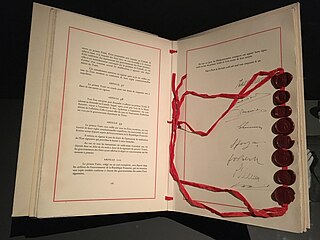Related Research Articles

The European Coal and Steel Community (ECSC) was an organisation of six European countries created after World War II to regulate their industrial production under a centralised authority. It was formally established in 1951 by the Treaty of Paris, signed by Belgium, France, Italy, Luxembourg, the Netherlands, and West Germany. The ECSC was the first international organisation to be based on the principles of supranationalism, and started the process of formal integration which ultimately led to the European Union.
Federalism is a mixed or compound mode of government that combines a general government with regional governments in a single political system. It can thus be defined as a form of government in which powers are divided between two levels of government of equal status.

Sovereignty is the supreme authority within a territory. Sovereignty entails hierarchy within the state, as well as external autonomy for states. In any state, sovereignty is assigned to the person, body, or institution that has the ultimate authority over other people in order to establish a law or change an existing law. In political theory, sovereignty is a substantive term designating supreme legitimate authority over some polity. In international law, sovereignty is the exercise of power by a state. De jure sovereignty refers to the legal right to do so; de facto sovereignty refers to the factual ability to do so. This can become an issue of special concern upon the failure of the usual expectation that de jure and de facto sovereignty exist at the place and time of concern, and reside within the same organization.

The Basic Law for the Federal Republic of Germany is the constitution of the Federal Republic of Germany.

A federation is a political entity characterized by a union of partially self-governing provinces, states, or other regions under a central federal government (federalism). In a federation, the self-governing status of the component states, as well as the division of power between them and the central government, is typically constitutionally entrenched and may not be altered by a unilateral decision of either party, the states or the federal political body. Alternatively, a federation is a form of government in which sovereign power is formally divided between a central authority and a number of constituent regions so that each region retains some degree of control over its internal affairs.

The Treaty of Paris was signed on 18 April 1951 between France, Italy, West Germany, and the three Benelux countries, establishing the European Coal and Steel Community (ECSC), which subsequently became part of the European Union. The treaty came into force on 23 July 1952 and expired on 23 July 2002, exactly fifty years after it came into effect.

German Reich was the constitutional name for the German nation state that existed from 1871 to 1945. The Reich became understood as deriving its authority and sovereignty entirely from a continuing unitary German "national people", with that authority and sovereignty being exercised at any one time over a unitary German "state territory" with variable boundaries and extent. Although commonly translated as "German Empire", the word Reich here better translates as "realm" or territorial "reach", in that the term does not in itself have monarchical connotations. The word Kaiserreich is applied to denote an empire with an emperor; hence the German Empire of 1871–1918 is termed Deutsches Kaiserreich in standard works of reference. From 1943 to 1945, the official name of Germany became – but was not formally proclaimed – Großdeutsches Reich on account of the additional German peoples and associated territories annexed into the state's administration before and during the Second World War.

The European Communities (EC), sometimes referred to as the European Community, were three international organizations that were governed by the same set of institutions. These were the European Coal and Steel Community (ECSC), the European Atomic Energy Community, and the European Economic Community (EEC); the last of which was renamed the European Community (EC) in 1993 by the Maastricht Treaty, which formed the European Union.

The Charter of Fundamental Rights of the European Union (CFR) enshrines certain political, social, and economic rights for European Union (EU) citizens and residents into EU law. It was drafted by the European Convention and solemnly proclaimed on 7 December 2000 by the European Parliament, the Council of Ministers and the European Commission. However, its then legal status was uncertain and it did not have full legal effect until the entry into force of the Treaty of Lisbon on 1 December 2009.
Subsidiarity is a principle of social organization that holds that social and political issues should be dealt with at the most immediate level that is consistent with their resolution.

The Preamble to the United States Constitution, beginning with the words We the People, is a brief introductory statement of the Constitution's fundamental purposes and guiding principles. Courts have referred to it as reliable evidence of the Founding Fathers' intentions regarding the Constitution's meaning and what they hoped the Constitution would achieve.
A supranational union is a type of multinational political union where negotiated power is delegated to an authority by governments of member nation-states.

The institutions of the European Union are the seven principal decision-making bodies of the European Union (EU). They are, as listed in Article 13 of the Treaty on European Union:

The politics of the European Union are different from most other polities and states due to the unique nature of the European Union. The EU is similar to a confederation, where many policy areas are federalised into common institutions capable of making law; the competences to control foreign policy, defence policy or the majority of direct taxation policies are mostly reserved for the twenty-seven state governments. These areas are primarily under the control of the EU's member states although a certain amount of structured co-operation and coordination takes place in these areas. For the EU to take substantial actions in these areas, all Member States must give their consent. Union laws that override State laws are more numerous than in historical confederations; however the EU is legally restricted from making law outside its remit or where it is no more appropriate to do so at a state or local level (subsidiarity) when acting outside its exclusive competences. The principle of subsidiarity does not apply to areas of exclusive competence.

The question of whether the governance of the European Union (EU) lacks democratic legitimacy has been debated since the time of the European Economic Community in the late 1970s. This led in part to an elected European Parliament being created in 1979 and given the power to approve or reject EU legislation. Since then, usage of the term has broadened to describe newer issues facing the European Union. Voter turnout at Elections to the European Parliament fell consecutively at every election from the first in 1979 up to 2014, when it hit a low of 42.54% before finally rising in 2019. The 2014 turnout figure is lower than that of any national election in the 27 countries of the European Union, where turnout at national elections averages 68% across the EU.
Supranational law is a form of international law, based on the limitation of the rights of sovereign nations between one another. It is distinguished from public international law, because in supranational law, nations explicitly submit their right to make judicial decisions by treaty to a set of common tribunal. The United Nations Security Council and subordinate organizations, such as the International Court of Justice, are the only globally accepted supranational tribunals.

The European Union (EU) consists of 27 member states which are signatories to the founding treaties of the union and thereby shares in the privileges and obligations of membership. They have agreed by the treaties to share their own sovereignty through the institutions of the European Union in some aspects of government. State governments must agree unanimously in the Council for the union to adopt some policies; for others, collective decisions are made by qualified majority voting. These obligations and sharing of sovereignty within the EU make it unique among international organisations, as it has established its own legal order which by the provisions of the founding treaties is both legally binding and supreme on all the member states. A founding principle of the union is the principle of subsidiarity, meaning that decisions are taken collectively if and only if they cannot realistically be taken individually.
The legal status of Germany concerns the question of the extinction, or otherwise continuation, of the German nation state following the rise and downfall of Nazi Germany, and constitutional hiatus of the military occupation of Germany by the four Allied powers from 1945 to 1949. It became current once again when the German Democratic Republic joined the Federal Republic of Germany in 1990.
The Law of Spain is the legislation in force in the Kingdom of Spain, which is understood to mean Spanish territory, Spanish waters, consulates and embassies, and ships flying the Spanish flag in international waters. It is also applicable to the Spanish armed forces worldwide. Spanish law stems from the Spanish people through democratically elected institutions. Equally, part of the legislation comes from the supranational institutions of the European Union, which also enjoy democratic legitimacy.

The Joint Committee is, together with the Federal Convention, one of two non–steady constitutional bodies in the political and federal institutional system of the Federal Republic of Germany. It is designed as an emergency parliament in the case of a State of Defence. It consists of 48 members of which two thirds are members of the Bundestag and one third are members of the Bundesrat, the latter representing the governments of the states of Germany (Länder). It was established in 1968 by an amendment of the Basic Law. Ever since then, the Bundestag and the Bundesrat have elected members to serve on the committee, but, as a state of defence has never been declared, the Joint Committee has never convened as of 2020.
References
- 1 2 Die demokratische Legitimation der Tätigkeit Internationaler Organisationen (German) (PDF; 899 kB)
- ↑ "Federal Constitutional Court Press Release No. 72/2009 of 30 June 2009. Judgment of 30 June 2009: Act Approving the Treaty of Lisbon compatible with the Basic Law; accompanying law unconstitutional to the extent that legislative bodies have not been accorded sufficient rights of participation". Archived from the original on 22 October 2012. Retrieved 17 November 2012.
Due to this structural democratic deficit, which cannot be resolved in an association of sovereign national states (Staatenverbund), further steps of integration that go beyond the status quo may undermine neither the States' political power of action nor the principle of conferral. The peoples of the Member States are the holders of the constituent power. The Basic Law does not permit the special bodies of the legislative, executive and judicial power to dispose of the essential elements of the constitution, i.e. of the constitutional identity (Article 23.1 sentence 3, Article 79.3 GG). The constitutional identity is an inalienable element of the democratic self-determination of a people.
The original German uses the word Staatenverbund, which they translate as "association of sovereign states", rather than the word Staatenbund (confederation of states) or Bundesstaat (federal state).
- This article is partially or entirely translated from the article in German Wikipedia entitled " Staatenverbund " .